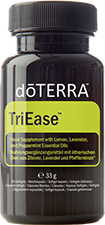Cardamom
Elettaria cardamomum
Native to Southeast Asia, Cardamom is added to traditional Indian sweets and teas for its cool, minty aroma and flavour. Add to bread, smoothies, meats, and salads to enhance flavour. Valued worldwide as a spice, Cardamom is an essential oil that may also prove beneficial in many other ways.

Cardamom
Elettaria cardamomum

Primary Benefits
- Known as one of the most flavourful essential oils.
- A versatile flavouring component widely used across the world in savoury dishes, commonly crushed in seed form to expose the oil and potent aroma.
- Cool, minty aroma and herbaceous flavour ideal for soups, salads and seasoning for savoury recipes.
Cardamom: The Perfect Baking Side-kick


Uses
- Add Cardamom to bread, smoothies, meats, and salads to enhance food flavour.
- Use Cardamom oil in place of cardamom seeds to enhance the flavour of many savoury recipes.
Directions for Use
Cautions
Possible skin sensitivity. Keep out of reach of children. If you are pregnant, nursing, or under a doctor’s care, consult your physician. Avoid contact with eyes, inner ears, and sensitive areas.
Complete Essentials
This Kit Contains
doTERRA Air™ (15 ml), doTERRA Air™ Vapour Stick, doTERRA Air™ Drops, TriEase™ Softgels, Lavender (15 ml), Melaleuca (15 ml), PB Assist™
Customers Also Buy

Lavender

Lemon

TriEase™ Softgels
Sourcing
Why Guatemala?
Cardamom is grown in both India and Guatemala. The plant grows well in both locations and climates. In India cardamom is used primarily for the local spice industry, whereas Guatemala's supply is typically exported.


How Does it Work?
Cardamom is a member of the ginger family. It grows best in the shade and the average cardamom plant lives seven years. It generally starts to bear fruit two to three years after planting and produces 10 to 20 cardamom seeds in each seedpod. Normally, it is harvested from September - February. Most cardamom is sold to the spice market.
The essential oil comes from the cardamom seeds inside the seedpods. The outer shell of the pod is green, thin, and papery. Inside are the seeds, which are small and black. They are dried for about 36 hours before being sold—either as a spice or for distillation. After drying, the cardamom pods are only a fifth of their fresh weight. The seeds are then steam-distilled for several hours to produce the essential oil.

Building Supplier Capacity in Guatemala
As part of mutually beneficial sourcing initiatives, doTERRA works to support farmers, producers and distillers through training and financial support. Here's how this affects cardamom farmers in Guatemala:
- Farmers are provided with bi-weekly training about best practices for growing cardamom
- Farmers also get hands-on experience so they can see the positive effects of these practices in their own fields
- As a result of this training, farmers can grow higher quality and increased quantity of cardamom – and therefore receive a higher price for their product

What's in your bottle?
You will find your Quality ID on the bottom of doTERRA single essential oil bottles purchased after May 2016. The Quality ID will contain a series of six or seven numbers and one letter.
Wellness is in the Air


Cardamom Elettaria cardamomum
Select your continent
Select your region
- Andorra
- Austria
- Belgium
- Bulgaria
- Croatia
- Cyprus
- Czech Republic
- Denmark
- Estonia
- Finland
- France
- Germany
- Greece
- Hungary
- Iceland
- Ireland
- Italy
- Latvia
- Liechtenstein
- Lithuania
- Luxembourg
- Malta
- Moldova
- Monaco
- Netherlands
- Norway
- Poland
- Portugal
- Romania
- Russia
- Slovakia
- Slovenia
- Spain
- Sweden
- Switzerland
- United Kingdom
- Ukraine
- Not Listed





